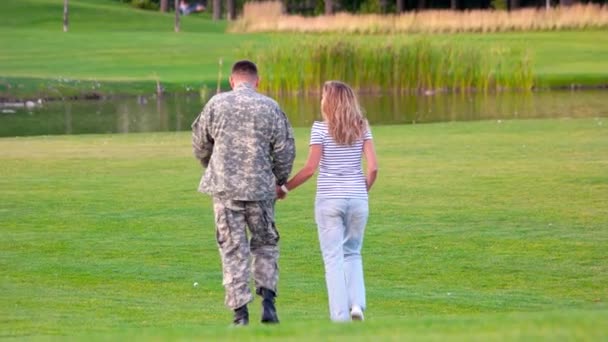By Alex Hietpas and Lynne Knobloch-Fedders
Reunion following deployment is a momentous occasion for military service members and their partners. However, homecoming is only the first day of a long and important transition for military couples, and navigating the relationship changes that occur can be quite challenging.
A recent study funded by the Congressionally Directed Medical Research Programs through the Military Operational Medicine Research Program investigated the relationship changes experienced by returning military service members and their partners after homecoming. A total of 555 military couples (including active duty, reserve component, and National Guard military couples from all branches of service) participated in the study.
Following the service member’s return home, both partners completed online questionnaires once per month for eight consecutive months. The questionnaire began with an open-ended question: “Has your romantic relationship changed in the past month? If so, list up to three ways your romantic relationship has changed.”
Military couples responded to this question with 7,387 separate comments, and content analysis was used to identify ten distinct areas of change. In a follow-up analysis, the study also assessed whether military couples experienced these changes as positive, negative, or neutral in valence. Overall, 42.1% of the changes couples described were positive, 32.4% were negative, and 25.5% were neutral.
The ten categories of relationship changes reported by military couples include the following:
Emotional intimacy, closeness, and support were characterized by themes of connection, self-disclosure, and emotional support experienced in the relationship. Of the 1,550 responses in this area, 69% of comments described positive changes, and 25% described negative changes.
Sexual and physical intimacy, romance, and affection described changes in physical affection, passion, and romance. Of the 1,137 responses that were coded in this category, 43% described positive changes, and 50% described negative changes.
Time spent together involved changes in the amount of quality time couples spent together. Couples wrote a total of 732 comments in this area; 54% of these responses were positive, while 41% were negative.
Appraisals of the relationship described couples’ observations of growth or difficulties in their relationships. From the 677 responses received in this domain, 71% were positive comments, and 18% were negative comments.
Life changes described changes in areas such as work, education, health, finances, and spirituality. A total of 621 comments comprised this category; 11% of these changes were positive, and 43% percent of changes were negative.
Readjustment to daily life comprised descriptions of acclimation to routines, schedule changes, and resumption of daily activities. These 586 responses described 44% positive changes and 36% negative changes.
The term Conflict described changes in patterns of disagreement and conflict resolution. The 452 comments in this area were 22% positive and 75% negative.
Family changes described changes in areas such as pregnancy, infertility, parenting, and family health. Of the 359 responses in this domain, 54% were positive comments, while 30% were negative comments.
Commitment encompassed changes in the status of the relationship, including marriage, separation, divorce, and infidelity. Of the 156 comments in this area, 38% were experienced as positive and 57% were experienced as negative.
Finally, 1,104 individuals said they experienced no change at various time points over the course of the study.
Findings from this study underscore the breadth and depth of relationship changes experienced by military couples during the post-deployment transition. Results indicate that military couples experience normative life changes alongside reunion-specific shifts, and couples facing multiple challenges at both levels may find that their coping resources deplete quickly.
A Call to Action
The results of this study indicate that targeted support services may be particularly valuable to help military couples navigate the post-deployment transition successfully. These services could help educate military couples about the types of changes – both positive and negative – they may experience in their relationship following reunion; promote relationship satisfaction; and foster relational coping skills, such as communication, problem-solving, and conflict resolution.
For further information about this study, and additional recommendations for prevention and intervention, check out this recent OneOp webinar, The Relationship Changes of Military Couples During Reintegration. Also, watch for a blog post next week, Trends in the Relationship Changes of Military Couples During the Reunion Period, that will discuss the trajectory and valence of changes military couples experience over time.
Reference
Knobloch-Fedders, L.M., Knobloch, L.K., Scott, S., & Fiore, H. (2020). Relationship changes of military couples during reintegration: A longitudinal analysis. Journal of Social and Personal Relationships, 37(7), 2145-2165. https://doi.org/10.1177/0265407520917461
Author Biographies
 Alex Hietpas, M.S., is a doctoral student in the Counseling Psychology program at Marquette University. His research interests involve the interpersonal processes that occur between romantic partners.
Alex Hietpas, M.S., is a doctoral student in the Counseling Psychology program at Marquette University. His research interests involve the interpersonal processes that occur between romantic partners.
 Lynne M. Knobloch-Fedders, Ph.D., is an associate professor in the Department of Counselor Education and Counseling Psychology at Marquette University, and a licensed clinical psychologist specializing in couple and family therapy. Her scholarship investigates the links between mental health, couple relationships, and psychotherapy process and outcome, with a particular emphasis on promoting military family health and well-being. Her research has been funded by the U.S. Department of Defense, the American Psychological Association’s Society for Military Psychology, and the American Psychological Foundation.
Lynne M. Knobloch-Fedders, Ph.D., is an associate professor in the Department of Counselor Education and Counseling Psychology at Marquette University, and a licensed clinical psychologist specializing in couple and family therapy. Her scholarship investigates the links between mental health, couple relationships, and psychotherapy process and outcome, with a particular emphasis on promoting military family health and well-being. Her research has been funded by the U.S. Department of Defense, the American Psychological Association’s Society for Military Psychology, and the American Psychological Foundation.













